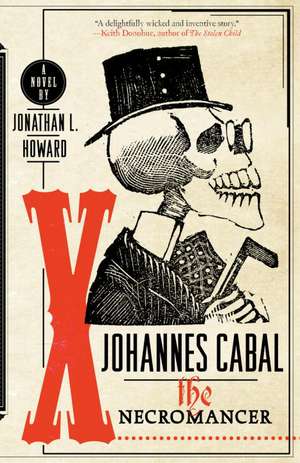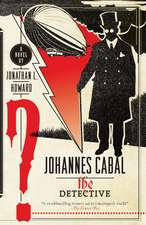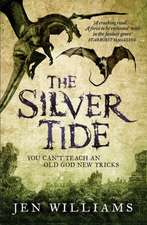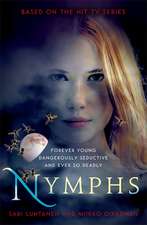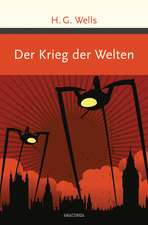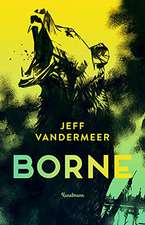Johannes Cabal the Necromancer
Autor JONATHAN L. HOWARDen Limba Engleză Paperback – 31 mai 2010
Johannes Cabal sold his soul years ago in order to learn the laws of necromancy. Now he wants it back. Amused and slightly bored, Satan proposes a little wager: Johannes has to persuade one hundred people to sign over their souls or he will be damned forever. This time for real. Accepting the bargain, Jonathan is given one calendar year and a traveling carnival to complete his task. With little time to waste, Johannes raises a motley crew from the dead and enlists his brother, Horst, a charismatic vampire to help him run his nefarious road show, resulting in mayhem at every turn.
| Toate formatele și edițiile | Preț | Express |
|---|---|---|
| Paperback (2) | 49.74 lei 3-5 săpt. | +26.44 lei 7-13 zile |
| Headline – 4 feb 2010 | 49.74 lei 3-5 săpt. | +26.44 lei 7-13 zile |
| Anchor Books – 31 mai 2010 | 94.98 lei 3-5 săpt. |
Preț: 94.98 lei
Nou
Puncte Express: 142
Preț estimativ în valută:
18.19€ • 18.74$ • 15.26£
18.19€ • 18.74$ • 15.26£
Carte disponibilă
Livrare economică 01-15 februarie
Preluare comenzi: 021 569.72.76
Specificații
ISBN-13: 9780767930765
ISBN-10: 0767930762
Pagini: 291
Dimensiuni: 130 x 203 x 18 mm
Greutate: 0.23 kg
Editura: Anchor Books
ISBN-10: 0767930762
Pagini: 291
Dimensiuni: 130 x 203 x 18 mm
Greutate: 0.23 kg
Editura: Anchor Books
Notă biografică
Jonathan L. Howard is a game designer and scriptwriter who has worked in the computer games industry since the early nineties, notably co-scripting the first three Broken Sword adventure games. This is his first novel. He lives near Bristol with his wife and daughter.
Extras
Chapter 1
* in which a scientist visits hell and a
deal is struck
Walpurgisnacht, the Hexennacht. The last night of April. The night of witches, when evil walks abroad.
He stood at a desolate and lonely place where there would be no interruption, no prying eyes. The air smelled metallic with freshly spilt blood; the body of a decapitated virgin kid goat lay nearby. He had no alloyed metal about him but for a thin-bladed sword of fine steel he held in his right hand; that arm was naked, his shirt sleeve rolled up to the biceps. A silver coin wrapped in paper nestled in his waistcoat pocket. Before him burned a fire of white wood.
His name was Johannes Cabal, and he was summoning a demon.
". . . Oarios! Almoazin! Arios! Membrot!" The chanted names faded into the unusually still night air. Only the crackling of the fire accompanied him. "Janna! Etitnamus! Zariatnatmix . . . and so on." He drew a deep breath and sighed, bored with the ritual. "A. E. A. J. A. T. M. O. . . ."
There was hidden meaning in the names he must call, the letters he must chant. That didn't mean he had to approve or even be impressed by them. As he recited the Grand Conjuration, he thought that some magicians might have better served the world by writing crossword puzzles.
Then space distorted, and he was no longer alone.
The demon's name was Lucifuge Rofocale. He stood a little taller than Cabal's six feet, but the bizarre fool's cap he wore--three flopping horns, or perhaps tentacles, ending with arrowheads--made his height vary from moment to moment. In one hand he held a bag containing, at least symbolically, the riches of the world. In the other, a golden hoop. He wore a segmented, studded leather skirt rather like a Roman soldier's. Beneath it, _fur-_covered legs ended in hooves. He had a fat anteater's tail, and a silly little Hercule Poirot moustache. As is often the case with demons, Lucifuge looked like an anatomical game of Consequences.
"Lo!" cried the demon. "I am here! What dost thou seek of me? Why dost thou disturb my repose? Smite me no more with that dread rod!" He looked at Cabal. "Where's your dread rod?"
"I left it at home," replied Cabal. "Didn't think I really needed it."
"You can't summon me without a dread rod!" said Lucifuge, appalled.
"You're here, aren't you?"
"Well, yes, but under false pretences. You haven't got a goatskin or two vervain crowns or two candles of virgin wax made by a virgin girl and duly blessed. Have you got the stone called Ematille?"
"I don't even know what Ematille is."
Neither did the demon. He dropped the subject and moved on. "Four nails from the coffin of a dead child?"
"Don't be fatuous."
"Half a bottle of brandy?"
"I don't drink brandy."
"It's not for you."
"I have a hip flask," said Cabal, and threw it to him. The demon caught it and took a dram.
"Cheers," said Lucifuge, and threw it back. They regarded each other for a long moment. "This really is a shambles," the demon added finally. "What did you summon me for, anyway?"
The Gates of Hell are an impressive structure. A great adamantine finger of rock a mile in diameter and two miles high punches through the surface of the cracked and baking desert plain of Limbo. On one side of this impenetrable edifice are the Gates themselves: massive iron constructions hundreds of feet wide and a thousand high. Their rough, barely worked surfaces are pocked and pitted with great bolts driven through in ragged lines, huge bands of brass running across in uneven ranks. One could be forgiven for thinking Hell's a popular place to get into.
Perhaps surprisingly, it is.
On the outside, one wonders what happens once you pass through that terrible, cruel portal. Some believe that all Hell is somehow crammed within the rock, a place where dimensions mean nothing. Others say that immediately beyond the Gates, within the hollowed rock, is a great chasm that opens into the pit of Hell, and that those stepping within must surely plunge straight to their eternal dooms. Others believe that the rock conceals the top of a very big escalator. Nobody on the outside knows for sure, but everyone wants to find out, and they want to find out because anything--anything--is better than the forms.
Lots of forms. Stacks of forms. An average of nine thousand, seven hundred, and forty-seven of them were required to gain entrance to Hell. The largest form ran to fifteen thousand, four hundred, and ninety-seven questions. The shortest to just five, but five of such subtle phraseology, labyrinthine grammar, and malicious ambiguity that, released into the mortal world, they would certainly have formed the basis of a new religion or, at the least, a management course.
This, then, was the first torment of Hell, as engineered by the soul of a bank clerk.
Nobody had to fill in the forms, of course. But, given that the _alternative was eternity spent naked in an endless desert that has never known night, most people found themselves sooner or later queuing up at the small porter's door set into one of Hell's Gates. There they would receive a form entitled "Infernal Regions (Local Authority) Hades Admission Application--Provisional (AAAA/342)" and a soft pencil.
Congas of hopeful applicants wound around the gatehouse like a line drawn by somebody wanting to find out how much writing you could get out of a box of ballpoints. The formerly quiet desert hummed to a steady drone of sub-vocalised reading and flipped pages. New arrivals and old hands queued patiently at the porter's door to hand in and receive forms. The quickest route through the paper trail necessitated the completion of two thousand, seven hundred, and _eighty-_five, but nobody had yet fulfilled the extremely narrow conditions that would permit such a speedy passage. Most could anticipate three or four times as many, not counting forms rejected for mistakes; the hand-picked team of administrative imps that dealt with admissions didn't like errors at all, nor did they issue erasers.
Through the muttering crowds, stepping over form-fillers and never pausing to apologise, came a pale man. Johannes Cabal was walking to Hell.
Tow-headed, lean, in his late twenties, but with any spirit of that youth long since evaporated, Cabal seemed otherwise unremarkable except for his air of intent, his unwavering advance on the gatehouse, and his clothes.
"Hey, watch it!" barked Al Capone, wrestling with the spelling of "venereal," as Cabal stepped over him. "Why don't you just . . ." The protest died on his lips. "Hey . . . Hey! That guy's dressed! He's got clothes!"
That guy did, indeed, have clothes. A short black frock coat, slouch-brimmed black hat, black trousers, black shoes, a white shirt, and a tidy black cravat. He wore dark-blue tinted glasses with side-baffles, and he carried a black gladstone bag. Unexciting clothes, but clothes nonetheless.
It was the first sensation that the desert had ever experienced. The damned parted before Cabal, who, in his turn, seemed to accept this as his due. Some excitedly speculated that he must be a messenger from the Other Place, that the end times had finally arrived. Others pointed out that nothing in Revelation referred to a man in a black hat and sensible shoes.
Cabal walked directly to the porter's door and slammed his hand on the closed window. While he waited for a reply, he looked about him, and the damned withered beneath his soulless and impassive gaze.
The window snapped open.
"What do ye want?" demanded a weasely man wearing a teller's shade from the other side, a man named Arthur Trubshaw.
Sartre said that Hell was other people. It transpires that one of the other people was Trubshaw. He had lived a life of bureaucratic exactitude as a clerk out in a dusty bank in a dusty town in the dusty Old West. He crossed all the "t"s and dotted all the "i"s. Then he made double entries of his double entries, filed the crossed "t"s, cross-referenced the dotted "i"s in tabulated form against the dotted "j"s, barred any zeroes for reasons of disambiguation, and shaded in the relative frequencies on a pie chart he was maintaining.
Arthur Trubshaw's life of licentious proceduralism was brought to an abrupt end when he was shot to death during a robbery at the bank. He did not die heroically: not unless one considers demanding a receipt from bandits as being in some sense praiseworthy.
Even in Hell, Trubshaw had continued to demonstrate an unswerving devotion to the penny ante, the nit-picking, the terribly trivial, the very things that had poisoned his soul and condemned him in the first place. Given such a mania for order, a den of chaos like Hell should have been an ideal punishment. Trubshaw, however, just regarded it as a challenge.
At first the demons assigned to torment him laughed diabolically at his aspirations and looked forward greedily to the sweet juices that drip from crushed hopes. Then they discovered that, while they had been laughing, Trubshaw had rationalised their tormenting schedules for maximum tormenting efficiency, organised a time-and-motion study for the imps, and, in passing, tidied the underwear drawers of the demon princes and princesses. Lilith, in particular, was mortified.
Never one to squander such a remarkably irritating talent, Satan put Trubshaw in charge of admissions. Hell had grown a new, unofficial ring.
"I want to see Satan. Now." Cabal's accent was clipped and faintly Teutonic. "I don't have an appointment."
By now Trubshaw had noticed the clothes and was considering possible explanations. "And who might ye be? The Archangel Gabriel?" He started the sentence as a joke but modified his tone halfway through. After all, perhaps it was.
"My name is Johannes Cabal. Satan will see me."
"So ye're nobody special, then?"
Cabal gave him a hard look. "It is hardly my place to say. Now, open this door."
Clothes or no clothes, Trubshaw decided he was on pretty familiar ground after all. He produced a copy of AAAA/342 and pushed it towards Cabal.
"Ye'll need to fill this in, mister!" he said, and indulged himself in a chuckle, a horrible noise, like a clockwork crow running down. Cabal gave the form a cursory glance and handed it back.
"You misunderstand. I'm not staying. I have business to discuss. Then I'm leaving." There was a muted gasp from the interested onlookers.
Trubshaw narrowed his eyes. "Leaving, ye reckon? Well, I reckon ye're wrong. This is Hell, sonny. Ye just can't come gallivanting in and out like a lady's excuse-me. Ye're dead and ye're staying. That's the way it's always been and that's the way it is now, y'hear?"
Cabal looked at him for a long, long moment. Then he smiled, a cold, horrid rictus that travelled up his face like rising damp. The crowd went very quiet. Cabal leaned close to Trubshaw.
"Listen, you pathetic little man . . . you pathetic little dead man. You're making a fundamental error. I'm not dead. Tried it once, didn't like it. Right now--right this instant, as I look into your rheumy little gimlet corpse eyes--I am alive. I have come here at great inconvenience, causing considerable disruption in my work, to talk to your seedy fallen angel of a boss. Now, open the door before you regret it."
Everybody shifted their attention to Trubshaw. This was going to be good.
"No, Mr. Fancy-Pants-Living-Fella, I ain't gonna open the door, and I ain't gonna regret it, neither. Know why? Because, as ye spotted so neatly despite them damn foolish spectacles, I'm dead, and, better yet, I'm on the payroll in these parts. My job's to make sure people fill in the paperwork. All the paperwork. Elseways, they don't get in, and right now, right this instant, I'm guessing that means you, too, ye lanky son of a bitch. So--what're ye going to do about that? Eh?"
For his answer, Cabal raised his bag until it was level with the window. Then he carefully opened it and, with a flourish like a stage magician, produced a skull.
Trubshaw shied away momentarily, but curiosity overcame him. "What ye got there, ye freak?"
Cabal's horrible smile deepened.
"It's your skull, Trubshaw." Trubshaw blanched and his eyes widened as he gazed at it. "I . . . 'liberated' it from your old town's cemetery. They still talk about your death there, you know. You've quite passed into local folklore."
"I always did my duty," said Trubshaw, unable to tear his eyes away from the skull.
"Oh, yes. Your name lives on to this day."
"Yeah?"
"Indeed." Cabal waited exactly long enough for pride to start swelling agreeably in Trubshaw's withered excuse for a heart before adding, "It has become a byword for stupidity."
Trubshaw blinked, the spell broken.
"Oh, yes. Well, what do you expect if you get yourself murdered for the sake of a receipt? Children say, 'You're as dumb as Trubshaw,' to their little playmates. When their parents refer to somebody remarkably stupid, they'll say, 'Well, there goes a proper Trubshaw and no mistake.' You can get souvenirs and everything. It's quite the cottage industry."
He smiled, and something like benevolence slipped into his expression for the first time. It was almost certainly a trick of the light.
Trubshaw incandesced with fury.
"How the heck do you reckon you're gonna get by me now, you goddamned Kraut? You really got my goat now, y'know. By jiminy, it'll be a cold day around here afore I let ye through!"
Cabal affected a yawn. "Your reputation is well deserved, Arthur Trubshaw. You think I stole this skull as a keepsake? Do you know who I am?"
"I don't care who ye are, mister! You can take yer bag a' bones and shove it right up ye--"
"I am Johannes Cabal. Necromancer."
It went very quiet indeed on both sides of the door. Word gets about in the shadowed places. Corpses exchange scuttlebutt and gossip, and they know all about the necromancers, the sorcerers who use the dead. They are the Bogeyman's Bogeymen.
"Now, Arthur, your choice is clear. You can open the door and let me in. Or I can go back to the land of the living in a truly abominable mood, raise you up from this place, put your cankerous soul into something that will do as a body, and then make you wish you were dead all over again. Repeatedly."
Cabal pulled down his _smoked-_glass spectacles far enough to show his hard, humourless eyes--grey flecked with blue that suggested tempered steel and difficult times ahead for any foe--and Trubshaw knew he meant every word. "Which is it to be?"
The Arch-Demon Ratuth Slabuth had been informed that Hell had been invaded and, being a general of the Infernal Hordes, did he intend to do anything about it? Flying devils were sent to reconnoitre the enemy force, but these quickly returned and--somewhat crestfallen--reported that the invaders consisted of one man with a short temper and sunglasses. Intrigued, the general had decided to take the situation into his own hands, claws, and writhing thorned tentacles.
Ratuth Slabuth, a stack of shifting _non-Euclidean angles topped by a horse's skull in a stylised, ancient-Grecian helmet, looked down from a great height upon the insolent human.
"This is Hell," he tried to explain for the third time. "Not a drop-in centre. You can't just turn up and say, 'Oh, I was just in the neighbourhood and thought I'd call by and have a bit of a chinwag with Lord Satan.' It simply isn't done."
"No," said the infuriating mortal. "It hasn't been done. There is a difference. May I pass now?"
"No, you may not. Satan's a very busy . . . um, is very busy right now. He can't go interrupting his work for every Tom, Dick, and Johannes"--he paused for effect, but the human just looked at him with a faint air of what seemed to be pity--"Harry, that is, who turns up demanding audience."
"Really?" said Cabal. "I had no idea. I thought this would be an uncommon occurrence, unique even, but you seem to imply that it happens all the time. Fair enough."
Ratuth was just thinking how well he'd handled things when, suddenly, Cabal pointed directly at him. "I call you liar!" he spat. "I call you duplicitous, mendacious, and thoroughly amateur at both enterprises."
"What?" shrieked the demon general. "WHAT? You, a mere mortal, dare to call me thus?" The eldritch angles unfolded, the darkness about him deepened as he rose like some dreadful bird of prey. "I shall destroy you! I shall rend the very flesh from your skeleton, hollow your long bones, and play your funeral lament upon them! For I am Ratuth Slabuth! Dark General of the Infernal Hordes! Father of Desolation! Despoiler of Innocence! Look upon me, mortal, and know thy doom!"
Cabal, he noticed through his rage, looked calm. Worryingly so.
" 'Ratuth Slabuth,' eh?" said Cabal. "You wouldn't happen to have started your career as Ragtag Slyboots, Despoiler of Milk and Entangler of Shoelaces, would you?"
The effect was electric. Ratuth Slabuth folded up like an especially large deck of cards in the blink of an eye until he was the same height as Cabal.
"How did you know that?" he asked quickly.
"I'm a necromancer. You'd be surprised at the sources we dig up. Now, then, do I get my audience with Satan or do I spread rumours about a certain diabolic general's personal history? Which is it to be?"
From the Hardcover edition.
* in which a scientist visits hell and a
deal is struck
Walpurgisnacht, the Hexennacht. The last night of April. The night of witches, when evil walks abroad.
He stood at a desolate and lonely place where there would be no interruption, no prying eyes. The air smelled metallic with freshly spilt blood; the body of a decapitated virgin kid goat lay nearby. He had no alloyed metal about him but for a thin-bladed sword of fine steel he held in his right hand; that arm was naked, his shirt sleeve rolled up to the biceps. A silver coin wrapped in paper nestled in his waistcoat pocket. Before him burned a fire of white wood.
His name was Johannes Cabal, and he was summoning a demon.
". . . Oarios! Almoazin! Arios! Membrot!" The chanted names faded into the unusually still night air. Only the crackling of the fire accompanied him. "Janna! Etitnamus! Zariatnatmix . . . and so on." He drew a deep breath and sighed, bored with the ritual. "A. E. A. J. A. T. M. O. . . ."
There was hidden meaning in the names he must call, the letters he must chant. That didn't mean he had to approve or even be impressed by them. As he recited the Grand Conjuration, he thought that some magicians might have better served the world by writing crossword puzzles.
Then space distorted, and he was no longer alone.
The demon's name was Lucifuge Rofocale. He stood a little taller than Cabal's six feet, but the bizarre fool's cap he wore--three flopping horns, or perhaps tentacles, ending with arrowheads--made his height vary from moment to moment. In one hand he held a bag containing, at least symbolically, the riches of the world. In the other, a golden hoop. He wore a segmented, studded leather skirt rather like a Roman soldier's. Beneath it, _fur-_covered legs ended in hooves. He had a fat anteater's tail, and a silly little Hercule Poirot moustache. As is often the case with demons, Lucifuge looked like an anatomical game of Consequences.
"Lo!" cried the demon. "I am here! What dost thou seek of me? Why dost thou disturb my repose? Smite me no more with that dread rod!" He looked at Cabal. "Where's your dread rod?"
"I left it at home," replied Cabal. "Didn't think I really needed it."
"You can't summon me without a dread rod!" said Lucifuge, appalled.
"You're here, aren't you?"
"Well, yes, but under false pretences. You haven't got a goatskin or two vervain crowns or two candles of virgin wax made by a virgin girl and duly blessed. Have you got the stone called Ematille?"
"I don't even know what Ematille is."
Neither did the demon. He dropped the subject and moved on. "Four nails from the coffin of a dead child?"
"Don't be fatuous."
"Half a bottle of brandy?"
"I don't drink brandy."
"It's not for you."
"I have a hip flask," said Cabal, and threw it to him. The demon caught it and took a dram.
"Cheers," said Lucifuge, and threw it back. They regarded each other for a long moment. "This really is a shambles," the demon added finally. "What did you summon me for, anyway?"
The Gates of Hell are an impressive structure. A great adamantine finger of rock a mile in diameter and two miles high punches through the surface of the cracked and baking desert plain of Limbo. On one side of this impenetrable edifice are the Gates themselves: massive iron constructions hundreds of feet wide and a thousand high. Their rough, barely worked surfaces are pocked and pitted with great bolts driven through in ragged lines, huge bands of brass running across in uneven ranks. One could be forgiven for thinking Hell's a popular place to get into.
Perhaps surprisingly, it is.
On the outside, one wonders what happens once you pass through that terrible, cruel portal. Some believe that all Hell is somehow crammed within the rock, a place where dimensions mean nothing. Others say that immediately beyond the Gates, within the hollowed rock, is a great chasm that opens into the pit of Hell, and that those stepping within must surely plunge straight to their eternal dooms. Others believe that the rock conceals the top of a very big escalator. Nobody on the outside knows for sure, but everyone wants to find out, and they want to find out because anything--anything--is better than the forms.
Lots of forms. Stacks of forms. An average of nine thousand, seven hundred, and forty-seven of them were required to gain entrance to Hell. The largest form ran to fifteen thousand, four hundred, and ninety-seven questions. The shortest to just five, but five of such subtle phraseology, labyrinthine grammar, and malicious ambiguity that, released into the mortal world, they would certainly have formed the basis of a new religion or, at the least, a management course.
This, then, was the first torment of Hell, as engineered by the soul of a bank clerk.
Nobody had to fill in the forms, of course. But, given that the _alternative was eternity spent naked in an endless desert that has never known night, most people found themselves sooner or later queuing up at the small porter's door set into one of Hell's Gates. There they would receive a form entitled "Infernal Regions (Local Authority) Hades Admission Application--Provisional (AAAA/342)" and a soft pencil.
Congas of hopeful applicants wound around the gatehouse like a line drawn by somebody wanting to find out how much writing you could get out of a box of ballpoints. The formerly quiet desert hummed to a steady drone of sub-vocalised reading and flipped pages. New arrivals and old hands queued patiently at the porter's door to hand in and receive forms. The quickest route through the paper trail necessitated the completion of two thousand, seven hundred, and _eighty-_five, but nobody had yet fulfilled the extremely narrow conditions that would permit such a speedy passage. Most could anticipate three or four times as many, not counting forms rejected for mistakes; the hand-picked team of administrative imps that dealt with admissions didn't like errors at all, nor did they issue erasers.
Through the muttering crowds, stepping over form-fillers and never pausing to apologise, came a pale man. Johannes Cabal was walking to Hell.
Tow-headed, lean, in his late twenties, but with any spirit of that youth long since evaporated, Cabal seemed otherwise unremarkable except for his air of intent, his unwavering advance on the gatehouse, and his clothes.
"Hey, watch it!" barked Al Capone, wrestling with the spelling of "venereal," as Cabal stepped over him. "Why don't you just . . ." The protest died on his lips. "Hey . . . Hey! That guy's dressed! He's got clothes!"
That guy did, indeed, have clothes. A short black frock coat, slouch-brimmed black hat, black trousers, black shoes, a white shirt, and a tidy black cravat. He wore dark-blue tinted glasses with side-baffles, and he carried a black gladstone bag. Unexciting clothes, but clothes nonetheless.
It was the first sensation that the desert had ever experienced. The damned parted before Cabal, who, in his turn, seemed to accept this as his due. Some excitedly speculated that he must be a messenger from the Other Place, that the end times had finally arrived. Others pointed out that nothing in Revelation referred to a man in a black hat and sensible shoes.
Cabal walked directly to the porter's door and slammed his hand on the closed window. While he waited for a reply, he looked about him, and the damned withered beneath his soulless and impassive gaze.
The window snapped open.
"What do ye want?" demanded a weasely man wearing a teller's shade from the other side, a man named Arthur Trubshaw.
Sartre said that Hell was other people. It transpires that one of the other people was Trubshaw. He had lived a life of bureaucratic exactitude as a clerk out in a dusty bank in a dusty town in the dusty Old West. He crossed all the "t"s and dotted all the "i"s. Then he made double entries of his double entries, filed the crossed "t"s, cross-referenced the dotted "i"s in tabulated form against the dotted "j"s, barred any zeroes for reasons of disambiguation, and shaded in the relative frequencies on a pie chart he was maintaining.
Arthur Trubshaw's life of licentious proceduralism was brought to an abrupt end when he was shot to death during a robbery at the bank. He did not die heroically: not unless one considers demanding a receipt from bandits as being in some sense praiseworthy.
Even in Hell, Trubshaw had continued to demonstrate an unswerving devotion to the penny ante, the nit-picking, the terribly trivial, the very things that had poisoned his soul and condemned him in the first place. Given such a mania for order, a den of chaos like Hell should have been an ideal punishment. Trubshaw, however, just regarded it as a challenge.
At first the demons assigned to torment him laughed diabolically at his aspirations and looked forward greedily to the sweet juices that drip from crushed hopes. Then they discovered that, while they had been laughing, Trubshaw had rationalised their tormenting schedules for maximum tormenting efficiency, organised a time-and-motion study for the imps, and, in passing, tidied the underwear drawers of the demon princes and princesses. Lilith, in particular, was mortified.
Never one to squander such a remarkably irritating talent, Satan put Trubshaw in charge of admissions. Hell had grown a new, unofficial ring.
"I want to see Satan. Now." Cabal's accent was clipped and faintly Teutonic. "I don't have an appointment."
By now Trubshaw had noticed the clothes and was considering possible explanations. "And who might ye be? The Archangel Gabriel?" He started the sentence as a joke but modified his tone halfway through. After all, perhaps it was.
"My name is Johannes Cabal. Satan will see me."
"So ye're nobody special, then?"
Cabal gave him a hard look. "It is hardly my place to say. Now, open this door."
Clothes or no clothes, Trubshaw decided he was on pretty familiar ground after all. He produced a copy of AAAA/342 and pushed it towards Cabal.
"Ye'll need to fill this in, mister!" he said, and indulged himself in a chuckle, a horrible noise, like a clockwork crow running down. Cabal gave the form a cursory glance and handed it back.
"You misunderstand. I'm not staying. I have business to discuss. Then I'm leaving." There was a muted gasp from the interested onlookers.
Trubshaw narrowed his eyes. "Leaving, ye reckon? Well, I reckon ye're wrong. This is Hell, sonny. Ye just can't come gallivanting in and out like a lady's excuse-me. Ye're dead and ye're staying. That's the way it's always been and that's the way it is now, y'hear?"
Cabal looked at him for a long, long moment. Then he smiled, a cold, horrid rictus that travelled up his face like rising damp. The crowd went very quiet. Cabal leaned close to Trubshaw.
"Listen, you pathetic little man . . . you pathetic little dead man. You're making a fundamental error. I'm not dead. Tried it once, didn't like it. Right now--right this instant, as I look into your rheumy little gimlet corpse eyes--I am alive. I have come here at great inconvenience, causing considerable disruption in my work, to talk to your seedy fallen angel of a boss. Now, open the door before you regret it."
Everybody shifted their attention to Trubshaw. This was going to be good.
"No, Mr. Fancy-Pants-Living-Fella, I ain't gonna open the door, and I ain't gonna regret it, neither. Know why? Because, as ye spotted so neatly despite them damn foolish spectacles, I'm dead, and, better yet, I'm on the payroll in these parts. My job's to make sure people fill in the paperwork. All the paperwork. Elseways, they don't get in, and right now, right this instant, I'm guessing that means you, too, ye lanky son of a bitch. So--what're ye going to do about that? Eh?"
For his answer, Cabal raised his bag until it was level with the window. Then he carefully opened it and, with a flourish like a stage magician, produced a skull.
Trubshaw shied away momentarily, but curiosity overcame him. "What ye got there, ye freak?"
Cabal's horrible smile deepened.
"It's your skull, Trubshaw." Trubshaw blanched and his eyes widened as he gazed at it. "I . . . 'liberated' it from your old town's cemetery. They still talk about your death there, you know. You've quite passed into local folklore."
"I always did my duty," said Trubshaw, unable to tear his eyes away from the skull.
"Oh, yes. Your name lives on to this day."
"Yeah?"
"Indeed." Cabal waited exactly long enough for pride to start swelling agreeably in Trubshaw's withered excuse for a heart before adding, "It has become a byword for stupidity."
Trubshaw blinked, the spell broken.
"Oh, yes. Well, what do you expect if you get yourself murdered for the sake of a receipt? Children say, 'You're as dumb as Trubshaw,' to their little playmates. When their parents refer to somebody remarkably stupid, they'll say, 'Well, there goes a proper Trubshaw and no mistake.' You can get souvenirs and everything. It's quite the cottage industry."
He smiled, and something like benevolence slipped into his expression for the first time. It was almost certainly a trick of the light.
Trubshaw incandesced with fury.
"How the heck do you reckon you're gonna get by me now, you goddamned Kraut? You really got my goat now, y'know. By jiminy, it'll be a cold day around here afore I let ye through!"
Cabal affected a yawn. "Your reputation is well deserved, Arthur Trubshaw. You think I stole this skull as a keepsake? Do you know who I am?"
"I don't care who ye are, mister! You can take yer bag a' bones and shove it right up ye--"
"I am Johannes Cabal. Necromancer."
It went very quiet indeed on both sides of the door. Word gets about in the shadowed places. Corpses exchange scuttlebutt and gossip, and they know all about the necromancers, the sorcerers who use the dead. They are the Bogeyman's Bogeymen.
"Now, Arthur, your choice is clear. You can open the door and let me in. Or I can go back to the land of the living in a truly abominable mood, raise you up from this place, put your cankerous soul into something that will do as a body, and then make you wish you were dead all over again. Repeatedly."
Cabal pulled down his _smoked-_glass spectacles far enough to show his hard, humourless eyes--grey flecked with blue that suggested tempered steel and difficult times ahead for any foe--and Trubshaw knew he meant every word. "Which is it to be?"
The Arch-Demon Ratuth Slabuth had been informed that Hell had been invaded and, being a general of the Infernal Hordes, did he intend to do anything about it? Flying devils were sent to reconnoitre the enemy force, but these quickly returned and--somewhat crestfallen--reported that the invaders consisted of one man with a short temper and sunglasses. Intrigued, the general had decided to take the situation into his own hands, claws, and writhing thorned tentacles.
Ratuth Slabuth, a stack of shifting _non-Euclidean angles topped by a horse's skull in a stylised, ancient-Grecian helmet, looked down from a great height upon the insolent human.
"This is Hell," he tried to explain for the third time. "Not a drop-in centre. You can't just turn up and say, 'Oh, I was just in the neighbourhood and thought I'd call by and have a bit of a chinwag with Lord Satan.' It simply isn't done."
"No," said the infuriating mortal. "It hasn't been done. There is a difference. May I pass now?"
"No, you may not. Satan's a very busy . . . um, is very busy right now. He can't go interrupting his work for every Tom, Dick, and Johannes"--he paused for effect, but the human just looked at him with a faint air of what seemed to be pity--"Harry, that is, who turns up demanding audience."
"Really?" said Cabal. "I had no idea. I thought this would be an uncommon occurrence, unique even, but you seem to imply that it happens all the time. Fair enough."
Ratuth was just thinking how well he'd handled things when, suddenly, Cabal pointed directly at him. "I call you liar!" he spat. "I call you duplicitous, mendacious, and thoroughly amateur at both enterprises."
"What?" shrieked the demon general. "WHAT? You, a mere mortal, dare to call me thus?" The eldritch angles unfolded, the darkness about him deepened as he rose like some dreadful bird of prey. "I shall destroy you! I shall rend the very flesh from your skeleton, hollow your long bones, and play your funeral lament upon them! For I am Ratuth Slabuth! Dark General of the Infernal Hordes! Father of Desolation! Despoiler of Innocence! Look upon me, mortal, and know thy doom!"
Cabal, he noticed through his rage, looked calm. Worryingly so.
" 'Ratuth Slabuth,' eh?" said Cabal. "You wouldn't happen to have started your career as Ragtag Slyboots, Despoiler of Milk and Entangler of Shoelaces, would you?"
The effect was electric. Ratuth Slabuth folded up like an especially large deck of cards in the blink of an eye until he was the same height as Cabal.
"How did you know that?" he asked quickly.
"I'm a necromancer. You'd be surprised at the sources we dig up. Now, then, do I get my audience with Satan or do I spread rumours about a certain diabolic general's personal history? Which is it to be?"
From the Hardcover edition.
Recenzii
“Witty, inventive, and thoroughly entertaining, this rollicking Faustian adventure grabs the reader and holds him until the very last page.” --Tucson Citizen
"The spot-on work of a talented writer." --Denver Post
“Howard makes it look easy to paint a soul-stealing murdering necromancer as a sympathetic character; that, folks, is worth the price of admission. Step right up!” —San Diego Union-Tribune
“For anyone whose taste edges towards the intelligent and macabre, this book is a gift." —Fangoria
“Amusing and clever.”—The Free-lance Star
“Populated with some of the most creative, and odd, characters to be found . . . hysterical and fascinating.”—Bookgeeks
"A delightfully wicked and inventive story." --Keith Donohue, author of The Stolen Child
“Cross Susannah Clarke's Jonathan Strange & Mr. Norrell with Gregory Maguire's Wicked, and you have this witty and sometimes touching debut novel in the Faustian tradition.”—Library Journal
“That ole black magic has never been more fun than it is in this deft and quirky Faustian take. A diabolical romp.” —Elle Newmark, author of The Book of Unholy Mischief
"The spot-on work of a talented writer." --Denver Post
“Howard makes it look easy to paint a soul-stealing murdering necromancer as a sympathetic character; that, folks, is worth the price of admission. Step right up!” —San Diego Union-Tribune
“For anyone whose taste edges towards the intelligent and macabre, this book is a gift." —Fangoria
“Amusing and clever.”—The Free-lance Star
“Populated with some of the most creative, and odd, characters to be found . . . hysterical and fascinating.”—Bookgeeks
"A delightfully wicked and inventive story." --Keith Donohue, author of The Stolen Child
“Cross Susannah Clarke's Jonathan Strange & Mr. Norrell with Gregory Maguire's Wicked, and you have this witty and sometimes touching debut novel in the Faustian tradition.”—Library Journal
“That ole black magic has never been more fun than it is in this deft and quirky Faustian take. A diabolical romp.” —Elle Newmark, author of The Book of Unholy Mischief
Descriere
Descriere de la o altă ediție sau format:
Will appeal to fans of Terry Pratchett and Tim Burton
Will appeal to fans of Terry Pratchett and Tim Burton
